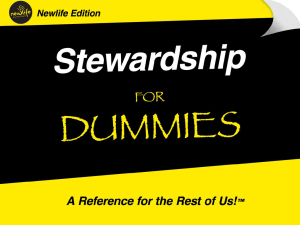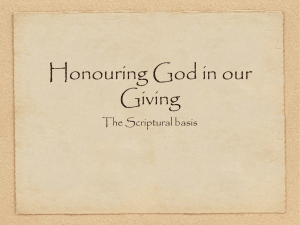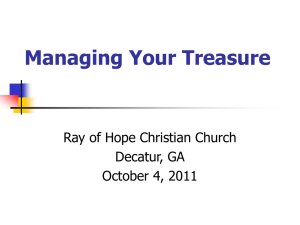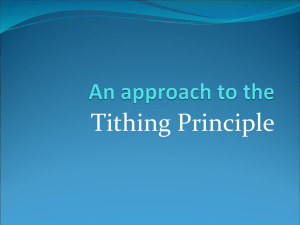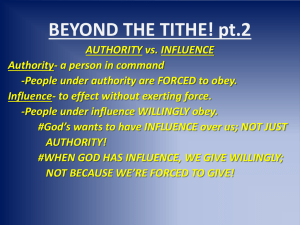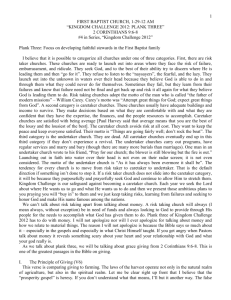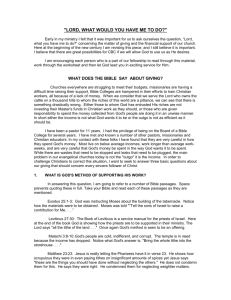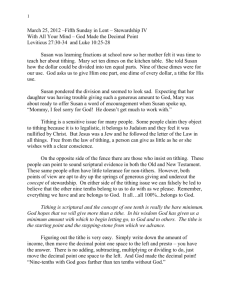Church Membership and the Tithe: An Ethical Study on Restricted
advertisement
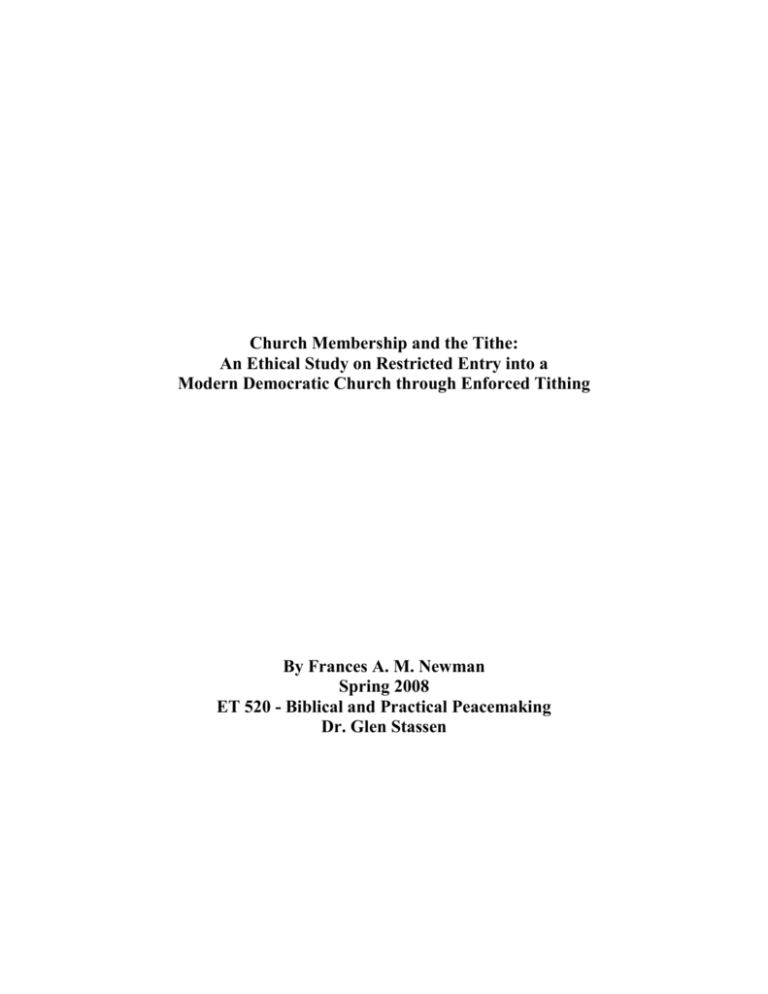
Church Membership and the Tithe: An Ethical Study on Restricted Entry into a Modern Democratic Church through Enforced Tithing By Frances A. M. Newman Spring 2008 ET 520 - Biblical and Practical Peacemaking Dr. Glen Stassen Church Membership and the Tithe: An Ethical Study on Restricted Entry into a Modern Democratic Church through Enforced Tithing I. Introduction In January of 2008, a Florida couple reported that their Assembly of God pastor mandated for the first time that all members be required to tithe 10% of their gross income to retain membership status in good standing.1 In the prior 29 years, all members have had the power to affect church growth and direction by attending and voting on business decisions at the annual church business meetings. Personal hardship made it impossible for this couple to tithe; however, they were warned by their church’s pastor that if they did not tithe within a certain grace period, their church membership would be revoked. As a result, this action caused several veteran lay leaders and members, including the couple, to leave the church entirely. Aside from numerous practical issues, this incident raises serious ethical questions about whether or not the church has the biblical and moral authority to demand a percentage of income from its members and bring sanctions against members who refuse to tithe. This paper is not a polemic against tithing, but asks: What are the biblical and historical foundations for enforced tithing? Are there any data on the impacts of required tithing, and if so, what are they? Are there any studies of how the practice affects the relationships between clergy and laity? If serving depends upon membership, and membership on tithing, what does this imply about recruiting servers? Is required tithing the most effective way to raise financial support for a church? Is this an isolated incident or is this a widespread trend in presbyterian or congregationalist sectarian churches today? How does enforced tithing impact this type of church in the long term? How does it affect its relationship, both individually and corporately, with God? Many Christian pastors, church staff, and lay leaders will eventually address a variety of roles in ministry. One role that is often overlooked, but plays a crucial part in the overall function of the church, is that of financial overseer. “Many Christian workers have questions about how fundraising fits into their ministry.”2 More than 200 books (and countless periodicals) archived at Fuller Theological Seminary’s McAlister Library cover the topic of stewardship in the modern church and many provide “how-to” guidance for developing a strategy on how to get the job done. Surprisingly, while many encourage voluntary stewardship or pledge campaigns, more than a few of these books stress enforced tithing as a Biblical mandate. This paper will address one rationale behind this strategy is that this removes the “unscriptural” pressure off of the pastoral leadership from having to “beg” its members for the funds needed to operate and develop a solid support base for the church. Scripture, the rationale continues, rather supports fundraising from the pulpit only for special missions and visiting missionaries, as well as other special causes. This paper will challenge the validity of this rationale, and will further show that restricting membership into a democratic (majority-vote) church (not Roman Catholic, or even 1 Private conversation, November, 2008. Brian Rust and Barry McLeish, The Support-Raising Handbook – A Guide for Christian Workers, (Downers Grove, IL: InterVarsity, 1984), 7. 2 1 Methodist or Episcopalian church, where bishops, for the most part, guard church property) through enforced tithing 1) stems from fear as a result of loss of both grounding in Scripture and trust in God, and 2) leads to ecclesiastical authoritarianism, ethical and moral failure, and counterproductive ends, such as decline in membership and church income. II. Tithing and the Modern Church: Unlawful Transfer of Authority? Who lawfully collects the tithe in the modern church today? Gary North, in Tithing and the Church, asks this question and gives us a picture of a spineless, modern version of the Royal Priesthood. “The minister of God (today) is an ecclesiastical officer who comes as… God’s designated, ordained agent and insists on payment. That is, he should do this. In fact, he is too timid to do this in our day.”3 Consequently, North adds, the modern democratic church has “transferred the authority over the distribution of the tithe to the tithe-payer.”4 That the tithepayer controls who gets the tithe is now “unlawful” transfer of that authority. Hence, the authority, North added, of the institutional church to collect the tithe “is the most important economic mark of its God-delegated sovereignty.”5 Do churches today echo North’s sentiments? “Unfortunately, there is no one system that is right for every church. Different sizes, natures, pastors, and missions force churches to tailor financial systems to meet their needs.”6 But does this ever make it ethically and morally correct for the church to force the tenth from its members? Paul Richards may not think so. As director of Public Communications at Brigham Young University for 13 years, Richards recalls a story of Lu Ann F. Snyder, a “delightfully sardonic” secretary to BYU’s provost. When LDS (Latter Day Saints) church members would call the provost’s office wanting this or that, they would sometimes remind Lu Ann that as tithe payers, “they are paying her salary and she therefore had better hop to.”7 Her story, along with countless other face-offs Richards had over the years with BYU tithe-paying parents, led him to believe that while many of these parents viewed themselves as what he termed voting shareholders of BYU’s “worldwide board of trustees,” withholding tithing to effect change is not going to be taken very seriously.8 But then again, BYU is so large, and expected to fill so many roles, that it “becomes difficult for it to function as a university.”9 An article in The Economist showed that the LDS church's income comes from a spiritual commandment to its members to contribute 10% of their gross salary to the church.10 Nevertheless, churches are becoming more and more sophisticated in their enterprise. To most churches today, the issue is not the age-old question of whether the church has the authority to request the tithe, but keeping up with the latest technology so that the church is able to speak the same language as its shareholders. Passing the collection plate is now passé. “The changes in how tithing is done have been abetted by Americans' growing familiarity with handling their own financial assets. New Covenant Funds, a family of mutual funds that invest with 3 Gary North, Tithing and the Church (Tyler,Texas: Institute for Christian Economics, 1994), 22. Ibid., 22. 5 Ibid., 3. 6 Mack Tennyson, Church Finances for People Who Count (Grand Rapids, MI: Zondervan, 1990), 14. 7 Paul Richards, “Does Paying Tithing Make You a Voting Shareholder? Brigham Young University’s Worldwide Board of Trustees,” Dialogue, v. 26, Issue 3, (1993), 59. 8 Ibid. 9 Richards, “Does Paying Tithing Make You a Voting Shareholder?” 59. 10 “Render unto Smith,” Economist, v. 320, Issue 7715(July 13, 1991), 27. 4 2 Presbyterian principles as a guide, has a systematic withdrawal plan so that tithes can be automatically wired to a shareholder's church or to the church's own New Covenant mutual fund account, if it has one.”11 Tom Norwood, an ordained Presbyterian minister, works as a principal at Capstone Investment Partners, a tithing consulting firm that urges tithing capabilities on Web sites. After working with Norwood, Sardis Presbyterian Church in Charlotte, N.C., began to receive tithes through weekly online bank drafts from more than 15 percent of its congregants. 12 Demanding the tithe is nonetheless justified: Some defend the demand to guard against hypocrisy. When a Church of God pastor – who believed that a minister’s job was dealing with spiritual matters, while others handled the mundane tasks of money-counting – became so discouraged when his church went sour financially, he began to poke into records. He discovered that neither treasurer nor financial secretary was contributing a cent.13 “The Bible gives some space to secrecy in giving, but it gives no space whatsoever to hypocrisy.”14 After that discovery, the pastor felt it was his duty to know. Another popular justification is that by forcing members to tithe, the pastor not only eliminates one more step in the screening process for church leadership in the future, but the pastor can then depend on members to serve as the best model for teaching stewardship to peers. The model begins with the pastor – the most influential teacher among the adults – who by word and deed models acceptable behavior patterns for all members.15 A third rationale is that it frees the pastor from the role of beggar and restores legitimate authority of the church. “To undercut the institutional church’s source of funding is to compromise the testimony of the church as the inheritor of the Abrahamic promises. This weakens the church’s authority.”16 While it may be argued that Jesus, who owns the cattle on a thousand hills, has ultimate authority over the church, the New Testament does seem to develop a financial decision-making system through its overseers, deacons, elders and councils (Acts 6:17; 15:1-9). Under that system, North adamantly argues that church leaders should not “beg” for free-will offerings. “The church of Jesus Christ does not need free-will offerings. It needs predestined tithing. Royal priests should not beg.”17 Beggars, North says, cannot be rulers. “American evangelical churches have no power and little influence because they are beggars. No one in a position of authority pays a great deal of attention to organizations that have so little discipline over their own members that they must go outside the local membership to beg for money. The identifying mark of failure in life is beggary (Ps. 37:25).”18 Marek Fuchs, “To Tithe or Not to Tithe – These Days The Issue Only Starts There,” The New York Times, Religion Journal, Section B, (December 30, 2006), 7. 12 Ibid, 7. 13 Bartlett L. Hess and Margaret Johnston Hess, How to Have a Giving Church, (Nashville, New York: Abingdon, 1974), 107. 14 Ibid., 107. 15 Lyle E. Schaller, 44 Ways to Expand the Financial Base of Your Congregation, (Nashville: Abingdon, 1989), 41. 16 North, Tithing and the Church, 3. 17 Ibid., 46. 18 North, Tithing and the Church, 49. 11 3 Yet another justification for enforcing the tithe for membership is that the tither is made aware that the ministry and ministers of Christ deserve more than the haphazard and slothful giving which has characterized Christian stewardship.19 “Surely, even legalistic tithing honors Christ more than the sorry and selfish giving of the tidbits of money and goods left over after church members have satisfied their own desires.”20 III. What Does It Mean to Be a Member of a Democratic Church Today? Many of the nation’s democratic churches model themselves after megachurches, specifically the most influential congretationalist churches as determined by pastoral votes. We can observe what it means to be in a congregationalist church today by examining the membership techniques of the two most influential churches in America.21 Willow Creek Community Church in South Barrington, IL, states that the concept of membership – a “significant defining moment in one’s spiritual journey” – is biblical: “So we, who are many, are one body in Christ, and individually members one of another” (Romans 12:5). By becoming intentional about membership, congregants “move out of the vague clouds of good intentions and into the clear light of committed participation.” The church’s membership brochure, “The Heart of Willow Creek,” further states: Union with Christ, which happens at the instant of your conversion, means that you are part of His Church, solely as the result of His Grace. This ‘positional’ membership is eternal and unchanging. However, The Bible also urges ‘Positional Members’ to continue growing by becoming ‘Participating Members’ in a specific local assembly. Participating members are the core that can be counted on in fulfilling the mission of Willow Creek. Saddleback Church in Lake Forest, CA, says to become a member of its church one must B.E.L.O.N.G. – Become a follower of Jesus Christ through salvation and baptism; Embrace a life of purpose through the Great Commandment and the Great Commission; Live life together in the context of a small group; Offer your time and resources to others; Nurture relationships within the community by sharing your faith in Christ; Grow in spiritual health. Both churches quote the same scripture verse when asking that members tithe and give offerings to missions and the building funds: "But just as you excel in everything – in faith, in speech, in knowledge, in complete earnestness and in your love for us – see that you also excel in this grace of giving” (2 Cor. 8:7). IV. What the Bible Says about Tithing and Giving. “In some respects the Bible is silent on church finances. It does not talk about budgets, finance committees or financial reports.”22 However, we get a glimpse into a support system of tithes and offerings through a call to repentance in Malachi 3:8ff: 19 Marvin E. Tate, “Tithing: Legalism or Benchmark?” Review and Expositor, Vol. LXX, No. 2, (Spring, 1973), 161. 20 Ibid. John N. Vaughan, “The Church Report” (thechurchreport.com), July 2007. 22 Tennyson, Church Finances for People Who Count , 12. 21 4 Should people cheat God? Yet you have cheated me! But you ask, “What do you mean? When did we ever cheat you?” You have cheated me of the tithes and offerings due to me. You are under a curse, for your whole nation has been cheating me. Bring all the tithes into the storehouse so there will be enough food in my Temple. If you do,” says the LORD Almighty, “I will open the windows of heaven for you. I will pour out a blessing so great you won’t have enough room to take it in! Try it! Let me prove it to you. The earliest evidence of the ancient practice of tithing stems from Abraham’s giving of the tithe to Melchizedek, the priest of God Most High (Gen. 14:20). The tithe is a tenth of something... particularly the tenth that belongs to God (although this is an oxymoron, as Psalm 24:1 reminds us everything belongs to God). After an exhaustive search for his PhD dissertation on whether the church should teach tithing, Russell Earl Kelly identified four different categories of tithing in the Bible.23 The first, is the Pagan Definition: This definition does not distinguish between ecclesiastical tithes from church laws, personal tithes from trade, and agricultural tithes. The general tithe is of Pagan origin and precedes the Mosaic Law’s tithe by many centuries. In Genesis 41:34 Joseph encouraged the Egyptians to double their tithe in order to cover the lean years. In Genesis 14 Abraham was obligated to pay a tithe from the spoils of war in obedience to the Arab war custom. In New Testament times, the Roman Empire received the first tithe of 10 percent of grains and twenty percent of fruit trees from its conquered subjects, including Judah. Although an additional full ten percent “spoils of war” tithe was not incorporated into the Mosaic Law, an additional one percent is mentioned in Numbers 31:25-47.24 The second is the tithe as a General Offering: This is the most common among moderate and liberal churches which equate tithes with free-will offerings. Members are urged to begin with a small percentage of giving and gradually increase the percentage according to their ability. Among these churches there is little or no reference to an exact compulsory giving of ten percent from gross income as a legal requirement. Since many of the liberal churches assign Adam through Moses to mythology and believe the Pentateuch was written after the exile, they usually base their approach to giving on general principles rather than specific texts. Also, many who hold this position prefer to use “tithe” to refer to “net” income with certain limitations. They are more likely to say that the poor are not required to give tithes and that tithes are only required from those who make a profit from their labor. They also are more likely to say that church support is not required from those on bare government pension or welfare. The parents’ first duty is to provide essentials of food, clothing, and housing for their family.25 The third is the Ten Percent of Gross Income: The third definition of “tithe” is taught among many more conservative and fundamental churches. For these churches “tithe” refers to ten percent of gross income and is an expectation 23 Russell Earl Kelly, Should the Church Teach Tithing: A Theologian’s Conclusions about a Taboo Doctrine, (New York, Lincoln, Shanghai: Writers Club, 2000), 6-9. 24 Ibid., 7. 25 Ibid. 5 from all economic classes, both rich and poor alike. In addition to paying salaries of gospel workers and providing social programs, some smaller churches also use the tithe for building funds and payment of all church debts. Their position insists that the tithe is an unchanging biblical standard, or eternal principle, which reflects the character of God, preceded the Mosaic Law, and was, therefore, not abolished by the Mosaic Law. Exact tithing of ten percent of one’s gross income should be observed by all Christians, and free-will offerings are to be given in addition to the mandatory tithe. Without exception, the tithe must be returned to God first, while other necessities such as shelter, child care, medicine, food, heat, and clothing must be given less priority. The church is obligated to teach tithing because it is a biblical command.26 The fourth is the Old Covenant Ordinance for Israel: The biblical tithe was an ordinance of Mosaic Law for the use and benefit of national Israel under the Old Covenant. The full tithe was given to the tribe of Levi, first, in exchange for his loss of land inheritance in Israel, and second because of his servant service to his brothers in the Levitical house of Aaron who alone served as priests. A tenth of the first tithes was, in turn, given by the Levites to the priests who ministered at the altar. The basic tithe was not to be used for building houses of worship. Since pagan dust defiled, the original tithe consisted solely of the increase of land produce from God’s sanctified land of Israel and from the increase of animals herded on the land of Israel. Although the tithe could be exchanged for its monetary value, the tithe itself never consisted of money! A second (and third) tithe was also given to provide food for festival occasions, and to provide welfare food for widows, fatherless orphans and needy strangers in Israel.27 The last chapter of Leviticus explains the tenth is the LORD’s: “…it is holy unto the LORD…. And concerning the tithe of the herd, or of the flock… the tenth shall by holy unto the LORD” (Lev. 27). The tithe could be paid in-kind, such as of: first-fruits (Ex. 23:16), first-born animals (Lev. 27:26), of thank-offerings and others (Deut. 22. 23. 29; Lev 7:12, 37; and Ex. 29:39). “In view of this we can assume that many gave much more than the tithe of their incomes.”28 This is certainly true of the widow Zarephath who gave Elijah the last of her meal and oil (1 Kings 17:8-16). Full participation in the great festivals, which served as annual reminders of Israel’s unique identity, was possible only if one had the materials for the required sacrifice. So important was it for the poor to be afforded the opportunity to offer sacrifices that Deuteronomy prescribed the expanding of one’s family at the time of the Feast of Weeks and Feast of Booths to include the sojourner, the fatherless and the widow who are among you” (Deut. 16:9-15). Former Presbyterian minister Paul R. Lindholm believed that to tithe is to understand the general biblical principles of Christian stewardship.29 Those basic principles include: God, as creator, sustainer and owner of all, is supreme ruler over all; that all believers are called to be God’s stewards; that stewards are accountable to God; that faithful stewards serve out of gratitude; and the great purpose of Christian stewardship is to glorify God.30 These principles are 26 Kelly, Should the Church Teach Tithing, 8. Ibid., 9. 28 Paul R. Lindholm, First Fruits: Stewardship Thoughts and Stories From Around the World, (Pasadena, CA: Hope, 1993), 92. 29 Lindholm, First Fruits, 23-49. 30 Ibid. 27 6 examples of God-sanctioned covenantal faithfulness. Since God owns everything, Lindholm states, tithing is just one more example of being faithful to our covenant with God.31 A common question most Christian theologians ask is, What would Jesus do? When it comes to Christian stewardship, many pastors quote Sermon on the Mount: “For where your treasure is there will your heart be also” (Matthew 6:21). Nonetheless, “Jesus did not tithe, nor did he sin by failing to tithe because he was poor and did not own land or herd animals for his sustenance. The poor were only expected to give free-will offerings to the best of their ability.”32 New Testament examples of people giving more than a tenth include the widow and the two mites (Luke 21:1-4) and the tax collector Zaccheus, who when he received salvation, offered up half of all he had to the poor (Luke 19:8). These New Testament examples, along with many others, seem to indicate that although tithing was practiced extensively in the Old Testament, it was never enforced by the first-century Church. Tithes and offerings were voluntary acts of free will as a response to God and as acts of sustainability of the new, organizing church (Acts 2:4447; 1 Cor. 16:2; 2 Cor. 9:7).). The man and wife who promised to sell a piece of property were struck dead not because they withheld part of the selling price of their property before God, but because they broke a promise they had voluntarily made to God (Acts 5:4). These examples show that giving in the New Testament were acts of conscience, not acts of power and authority. The conscience of every Christian is what truly is at stake in requesting the tithe. That the church administers the decision of worshipers to give is secondary in its function as a moral authority. Its primary function as a moral authority is to exercise the will of God. To Apostle Paul, who equated friendship of the church in Philippi as a partnership in the ministry because of their generous offering to Paul’s Jerusalem collections, the very existence of the church was its primary function. John Howard Yoder reminds us that the church concentrates upon not being seduced by the powers of the world, powers over which Christ has had victory.33 “By existing, the Church demonstrates that their rebellion has been vanquished.”34 V. Ethical Implications of Enforced Tithing Enforced tithing has serious ethical implications, both individually and collectively, on the relationship between clergy and laity, and their relationship to God. While North claims “fear” and a “lack of respect for authority” are blamed for the trepidation of Christian leaders today in demanding the tithe from its members, there are those who argue that fear and misunderstanding, not reclaimed authority and entitlement, are at the root of demanding the tithe. “Jesus regarded stewardship of finances as indication of trustworthiness with spiritual things (Luke 16:11), which were more important (Matt. 6:19-20).”35 31 Lindhom, First-Fruits, 23-49. Kelly, Should the Church Teach Tithing, 9. 33 John Howard Yoder, The Politics of Jesus, (Grand Rapids, MI; Cambridge, UK: Eerdmans, 1994), 150. 34 Ibid. 35 Walter A. Elwell, ed., “Tithe, tithing,” Evangelical Dictionary of Biblical Theology,” (Grand Rapids, MI: Baker, 1996), 779-780. 32 7 The misunderstanding results in a loss of grounding in Scripture (which clearly supports free will), which in turn leads to a social ethic that permits a systematic method of enforcing giving that carries with it a spirit of legalism and authoritarianism, a world based on rules designed to sustain power, and not godly principles of love and justice. Although just persons will want to do the just thing, “they may be mistaken about what the just thing is. There were many just people who wanted to be fair to their slaves; it never occurred to them that making people slaves was itself unjust.”36 “Love must affirm and accept the freedom of the other.”37 “Conservative theology… which fails to consider the correct definition, purpose, and limitations of the biblical tithe… is both legalistic and harmful to the church which should be using much better New Covenant principles.”38 The New Covenant after Calvary, Kelly concludes, outlines New Covenant principles of giving which are “far superior” to the compulsory Old Covenant system. Halting growth of church income on a national level strongly indicates that people are taking their money elsewhere. According to the Giving USA Foundation group, Americans gave an estimated $97 billion to congregations in 2006, almost a third of all the country’s charitable donations.39 Giving to religion, they claim, is growing more slowly than other types of giving because “people are attending church less frequently and are giving to a wider array of (other) causes.”40 An increase in the number of US churchgoers are becoming opponents of tithing and are “writing letters and quitting congregations in protest.”41 In other cases, the growth of megachurches, “some with expensive worship centers equipped with coffee bars and widescreen TVs, have turned people off of tithing. And those who object are finding like-minded souls on the Web in theological forums.”42 While the issue of tithing is striking at the core of the American moral fabric, the moral question of stewardship is not a new one. Reinhold Neibuhr asked the unthinkable question in his Christian Century article entitled, “Is Stewardship Ethical?”43 Neihbur, it is suggested, remained skeptical. “Protestant idealism of any brand, including the teachings about stewardship, could be a seed-bred for moral self-deceptions and illusions.”44 The faculty to determine right from wrong is a God-given faculty that helps believers discern the weightier matters of the law. “Jesus refocused attention on inward attitudes. He criticized some who went so far as to tithe tiny grains of spice – not because they tithed, but 36 Lewis B. Smedes, Mere Morality: What God Expects from Ordinary People, (Grand Rapids, MI: Eerdmans, 1983), 26. 37 Glen H. Stassen and David P. Gushee, Kingdom Ethics: Following Jesus in Contemporary Context, (Downers Grove, IL: InterVarsity, 2003), 331. 38 Kelly, Should the Church Teach Tithing, 8. 39 Suzanne Sataline, “The Backlash Against Tithing,” The Wall Street Journal – Eastern Edition, Vol. 250, Issue 122 (November 23, 2007), W1-W4. 40 Ibid. 41 Ibid. 42 Ibid. 43 Robert Wood Lynn, “Protestant Perspectives upon Stewardship,” New Theology Review, Vol. 9, No. 4, (November 1996), 31. 44 Ibid. 8 because they neglected the weightier matters of the law (Matt. 23:23).”45 Attitudes reflect moral values. When these values are compromised, the conscience may feel violated and may react to the pain and discomfort by producing positive or negative change; in the case of the Florida couple, that change resulted in withdrawing from the church entirely. Judith Anderson, a divorced, working mother of two teenagers, was told by her church that the tithe was the minimum standard of giving.46 “Guilt is an odd weapon in the hands of charity…. In response to the insensitivity, many parishioners and visitors will wonder, ‘What are we doing here? They don’t even know we exist!’ And many will go away or try to be invisible because they have been made to feel that they cannot ‘afford’ church.”47 Additionally, people might tithe “partly to garner approval, and avoid disapproval, among relevant peers. In that case, their perception of what is right will be shaped by collective norms.”48 So how should the church ask for support? Are there any legitimate methods? Is it time for pastors to “start preaching the Biblically mandatory nature of the tithe if they want the church to lead in society,” as North vehemently suggests? Or other there other biblical models that appeal to the conscience of the worshipper without crippling the base support system of the church? Did Jesus himself, and Apostle Paul not teach us another way to exercise legitimate persuasion? I believe so. In describing Apostle Paul’s system of collecting funds for the Jerusalem church, Christian activist Ron Sider, who teaches the “graduated tithe,” pointedly explains: “Legalism is not the answer.”49 He said Apostle Paul, who frequently used the word koinonia as a synonym for collection, adhered to very clear guidelines for asking the Gentiles to share of their material resources in an inter-church network that supported the Jerusalem church: 1) Giving was general: give all you can, or “as he may prosper” (1 Cor. 16:2); 2) Giving was voluntary, noting that he was not issuing a command (2 Cor. 8:3); and, 3) Giving was for equality, that one’s abundance should supply another one’s want (2 Cor. 8:13-15).50 Equality to Paul was an indication of the greater principle of oneness in Christ.51 “History warns us against wooden application of God’s living Word… In applying the biblical teachings on the year of jubilee, the sabbatical year, gleaning, and tithing, then, we must discover the underlying principles. Then we can search for contemporary strategies to give flesh to these basic principles.”52 Elwell, “Tithe, tithing,” 779-780. Judith Anderson, “The Exquisitely Insensitive Approach to Tithing,” The Witness, Vol. 66, No. 1, (January, 1983), 10. 47 Anderson, The Exquisitely Insensitive Approach to Tithing, 11. 48 Ian Shapiro, “Notes on the Political Psychology of Redistribution,” Social Research, Vol. 73, Issue 2, (Summer, 2006), 609. 49 Ronald J. Sider, Rich Christians in an Age of Hunger: Moving from Affluence to Generosity, (W. Publishing Group, 1997), 84. 50 Ibid, 84. 51 Ibid, 82. 52 Sider, Rich Christians in an Age of Hunger, 74. 45 46 9 How good a system is may be measured by how well it cares for the widow, the orphan and the foreigner. Old Testament scriptures concerning wealth and poverty “are not prescriptive for action today in some naïve fashion but do afford a diagnostic for judging the effectiveness of current programs to assist the powerless in modern society.”53 Three potent words used in the Old Testament… mishpat (justice), hesed (loyalty) and rahmim (compassion), show that positive qualities of such a community are expressed. It is the Old Testament’s typical description of the nature of a healthy community.54 People like to be led, not forced or manipulated. There is a delicate balance between the two and the pastor’s job is to know the difference. “We are emotional beings. To be truthful about our work and needs we must be emotional and factual.” 55 Nehemiah pleaded his case to rebuild the Temple to the king by expressing his sadness (Neh. 2). Facts alone do not substantiate a pastor’s work. “The language and feelings we use to describe our mission will play a role in our asking for support. By fully informing and asking others, we’re helping them determine where they will support God’s work.” The church needs to heed to the words of Jesus on greed as much as any other entity. In defending tithing as a support system, Paul Lindholm reminds us that “greed usurps devotion to God, destroys peace in human relationships and leads to untold suffering by the impoverishment of people throughout the world.”56 Could the same be true for the church that demands material treasure from its members? In Colorado, a church raised funds through bonds to build a nursing home which, six years into the project, was still not completed. The money was secretly reallocated for television and other means of “communicating the gospel.” Eventually the pastor was indicted for fraud and the church filed bankruptcy. “This effort started out to glorify God; but it ended up just another humiliating witness of the Christian Church to the world.”57 VI. Conclusion This paper sought to ascertain that current trends in tithing in the modern church indicate an overall authoritarian shift in the modern church today and loss of scriptural grounding in free will and choice as the basis for such enforcement. The result is not just loss of income and membership numbers for the church, but more importantly, a serious ethical and moral failure of the church as a critical witness to both the individual churchgoer and the wider culture. There are biblical models that show us legitimate persuasion based on God’s overarching economic system of equality and justice for the poor, the orphan, the sojourner and the widow. When in serious need, the church should have financial reserves from which to draw support. Jesus predicted long ago that our hearts would follow our treasures. Legitimate methods that adhere to God’s principles, and not the Letter of the Law, yield to the recognition that God owns everything and gave us everything when he gave us Jesus Christ. Apostle Paul gave us the better Donald E. Gowen, “Wealth and Poverty in the Old Testament,” Interpretation 41 (1987), 341-343. Gowen, “Wealth and Poverty in the Old Testament,” 343. 55 Brian Rust and Barry McLeish, The Support-Raising Handbook: A Guide for Christian Workers, (Downers Grove, IL: InterVarsity, 1984), 17. 56 Lindholm, First Fruits, 74. 57 John M. Montgomery, Money, Power, Greed: Has the Church Been Sold Out? (Ventura, CA: Regal Books, 1987), 81. 53 54 10 model long ago for collecting money from congregants: give all you can, voluntarily, for the sake of equality. We can judge the effectiveness of current programs by how well they care for the poor and the marginalized. Facts alone will not work to raise support. People are highly emotional about money, and so a pledge campaign that appeals to their emotions, helps lend credence to a cause, and helps congregants exercise their God-given free will to determine whether they will support God’s work. The church as moral authority needs to avoid the pitfalls and trappings of greed. The result will be untold devotion to God, peace in human relationships and economic justice of people throughout the world. 11 References Elwell, Walter A. “Tithe, tithing.” Evangelical Dictionary of Biblical Theology, Grand Rapids, MI: 1996, 779-780. Fuchs, Marek. “To Tithe or Not to Tithe – These Days The Issue Only Starts There.” The New York Times, Religion Journal, Section B, December 30, 2006. Hess, Bartlett L. and Margaret Johnston Hess. How to Have a Giving Church. Nashville, New York: Abingdon, 1974. Gowan, Donald E. “Wealth and Poverty in the Old Testament.” Interpretation 41 (1987), 34143. Kelly, Russell Earl, Should the Church Teach Tithing? A Theologian’s Conclusions about a Taboo Doctrine. New York, Lincoln, Shanghai: Writers Club, 2000. Lindholm, Paul R. First Fruits: Stewardship Thoughts and Stories From Around the World. Pasadena, CA: Hope, 1993. Lynn, Robert Wood. “Protestant Perspectives upon Stewardship.” New Theology Review, Vol. 9, No. 4, (November 1996), 24-37. Montgomery, John M. Money, Power, Greed: Has the Church Been Sold Out? Ventura, CA: Regal Books, 1987. North, Gary. Tithing and the Church. Tyler,Texas: Institute for Christian Economics, 1994. “Render unto Smith.” Economist, v. 320, Issue 7715(July 13, 1991), 27. Richards, Paul. “Does Paying Tithing Make You a Voting Shareholder? Brigham Young University’s Worldwide Board of Trustees.” Dialogue, v. 26, Issue 3, (1993), 59-69. Rust, Brian and Barry McLeish. The Support-Raising Handbook – A Guide for Christian Workers. Downers Grove, IL: InterVarsity, 1984. Sataline, Suzanne. “The Backlash Against Tithing.” The Wall Street Journal – Eastern Edition, Vol. 250, Issue 122 (November 23, 2007), W1-W4. Schaller, Lyle E. 44 Ways to Expand the Financial Base of Your Congregation. Nashville: Abingdon, 1989. Shapiro, Ian. “Notes on the Political Psychology of Redistribution.” Social Research, Vol. 73, Issue 2, (Summer, 2006), 607-618. 12 Sider, Ronald J. Rich Christians in an Age of Hunger: Moving from Affluence to Generosity. W. Publishing Group, 1997. Smedes, Lewis B. Mere Morality: What God Expects from Ordinary People. Grand Rapids, MI: Eerdmans, 1983. Stassen, Glen H. and David P. Gushee. Kingdom Ethics: Following Jesus in Contemporary Context. Downers Grove, IL: InterVarsity, 2003. Tate, Marvin E. “Tithing: Legalism or Benchmark?” Review and Expositor, Vol. LXX, No. 2, (Spring, 1973), 153-161. Tennyson, Mack. Church Finances for People Who Count. Grand Rapids, MI: Zondervan Publishing House, 1990. Vaughan, John N. “The Church Report.” (thechurchreport.com), July 2007. Yoder, John Howard. The Politics of Jesus. Grand Rapids, MI; Cambridge, UK: Eerdmans, 1994. 13
